Related Research Articles
Middleground was an American Thoroughbred racehorse who won the 1950 Kentucky Derby and Belmont Stakes and came second in the Preakness Stakes. He was named the 1950 American Horse of the Year and Champion Three-Year-Old Male.

Aristides (1872–1893) was an American Thoroughbred racehorse that won the first Kentucky Derby in 1875.

Hindoo (1878–1901) was an outstanding American Thoroughbred race horse who won 30 of his 35 starts, including the Kentucky Derby, the Travers Stakes, and the Clark Handicap. He later sired Preakness Stakes winner Buddhist and Belmont Stakes winner and Leading sire in North America Hanover.

Samuel Clay Hildreth was an American Thoroughbred horse racing Hall of Fame trainer and owner.

John Patrick Loftus was an American thoroughbred horse racing Hall of Fame jockey.
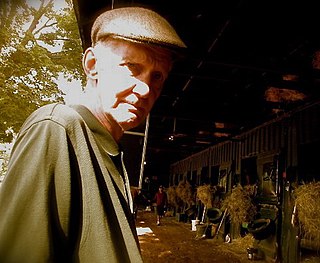
William H. Turner Jr. was an American Thoroughbred flat racing trainer best known for winning the United States Triple Crown of Thoroughbred Racing in 1977 with Seattle Slew.

Frederick J. Taral was an American Hall of Fame jockey.
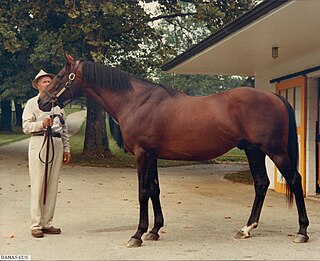
Damascus was a champion American Thoroughbred racehorse who was the 1967 Horse of the Year after winning the Preakness Stakes, Belmont Stakes, Travers Stakes, Jockey Club Gold Cup, Woodward Stakes, and Dwyer Stakes. Damascus also came third in the Kentucky Derby that year.
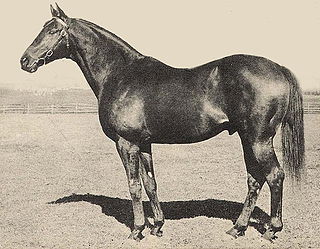
Bimelech was a champion Thoroughbred racehorse who won two Triple Crown races and was a Champion at both age two and three. He was ranked #84 among U.S. racehorses of the 20th century. After retiring to stud, he sired 30 stakes winners and his daughters produced 50 stakes winners.

Henry of Navarre (1891–1917) was an American Hall of Fame Thoroughbred Champion racehorse.
Chateaugay was an American Thoroughbred Champion racehorse who won two of the three U.S. Triple Crown races. Bred at Darby Dan Farm near Lexington, Kentucky by his prominent owner, John W. Galbreath, Chateaugay was a son of Swaps, the 1956 U.S. Horse of the Year and a Racing Hall of Fame inductee.
Edward Riley Bradley was an American steel mill laborer, gold miner, businessman and philanthropist. As well as a race track proprietor, he was the preeminent owner and breeder of Thoroughbred racehorses in the Southern United States during the first three decades of the 20th century. Testifying before a United States Senate committee in April 1934, Bradley identified himself as a "speculator, raiser of race horses and gambler". He appeared on the cover of Time magazine on May 7, 1934. In the year 2000, the Florida Department of State honored him as one of their Great Floridians.
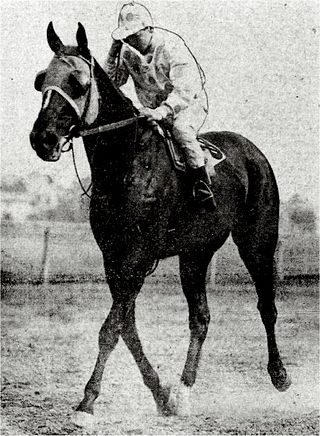
Peter Pan (1904–1933) was an American Thoroughbred racehorse and sire, bred and raced by prominent horseman, James R. Keene. As winner of the Belmont Stakes, the Brooklyn Derby and the Brighton Handicap, he was later inducted into the National Museum of Racing and Hall of Fame. His progeny included many famous American racehorses, including several winners of the Kentucky Derby and the Preakness Stakes.
King James was an American Thoroughbred racehorse. Bred by one of America's most important breeders, John E. Madden, he was the son of 1898 Kentucky Derby winner Plaudit. Although burdened by a bad stride that limited his racing ability, King James raced for five years, won a number of top events, and is acknowledged as the historical American Champion Older Male Horse of 1909.

Kentucky (1861–1875), was a successful American Thoroughbred racehorse who won 21 of his 23 starts, including 20 consecutive wins.
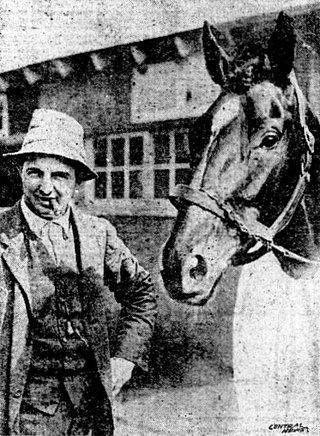
Louis C. Feustel was an American Thoroughbred horse racing Hall of Fame trainer best known as the trainer of Man o' War.
Pavot was an American Thoroughbred Champion racehorse. In a career that lasted from 1944 to 1946 he ran thirty-two times and won fourteen races. He was the leader of his generation in 1944 when he was named American Champion Two-Year-Old Colt. The following year he recorded his most important win in the Belmont Stakes.

Harry Bassett (1868–1878) was an American Thoroughbred racehorse, winner of the 1871 Belmont Stakes and an outstanding racehorse of the 19th century. He also won a number of other stakes races, and was named the Champion male of his age group in 1870, 1871 and 1872. He was retired to stud duties in New Jersey when his five-year racing career ended, having recorded 23 wins from 36 starts. Harry Bassett died in New Jersey in 1878 and was inducted into the United States Racing Hall of Fame in 2010.

Tom Fool was a champion American Thoroughbred racehorse who was the 1953 American Horse of the Year and was inducted into the Racing Hall of Fame. He sired the champion racehorses Buckpasser and Tim Tam.
Grenada was an American Thoroughbred racehorse. He won the 1880 Preakness Stakes, Belmont Stakes, and Travers Stakes. He is one of only seven horses to have won these three races.
References
- ↑ Kentucky Horse Park
- ↑ International Museum of the Horse
- ↑ "Ansel Williamson | National Museum of Racing and Hall of Fame".
- ↑ Ansel Williamson Archived July 20, 2014, at the Wayback Machine - Retrieved 2014-06-07